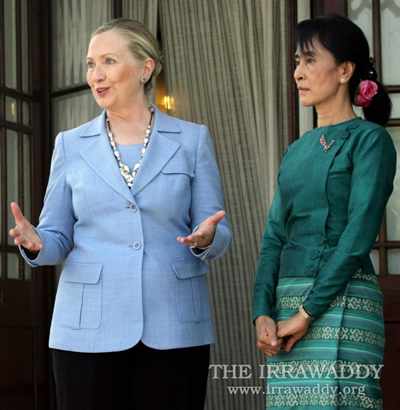ULAN BATOR, Mongolia—US Secretary of State Hillary Clinton took aim at China’s model of economic growth without democracy on Monday, arguing that it undermines long-term prospects and urging other Asian countries to expand markets and political freedom at the same time.
Without mentioning Beijing by name, Clinton laid out a week of diplomatic efforts she’ll make across Asia to press governments into improving the rule of law and free expression. Speaking at a woman’s event in Mongolia, China’s northern neighbor, she said limiting freedom “kills innovation and discourages entrepreneurship,” and ultimately undermines economic expansion.
“We need to make the 21st century a time in which people across Asia don’t only become more wealthy,” she said. “They must also become more free.”
 She contrasted Mongolia’s path with that of other Asian governments who’ve fought the trend toward greater liberty, while also holding up the democratic achievements in Thailand, Taiwan and even Burma, also known as Myanmar, to dispel the notion that democracy is antithetical to Asian values. She rejected suggestions that democracy upsets stability or is a privilege for the wealthy.
She contrasted Mongolia’s path with that of other Asian governments who’ve fought the trend toward greater liberty, while also holding up the democratic achievements in Thailand, Taiwan and even Burma, also known as Myanmar, to dispel the notion that democracy is antithetical to Asian values. She rejected suggestions that democracy upsets stability or is a privilege for the wealthy.
“This is the right time to talk about democracy in Asia, as many countries in this region grapple with the question of which model of governance best suits their society and circumstances,” she said. “The path they choose will shape the lives of billions of people and the future of this region.”
The message reflects the battle of values between Washington and Beijing as they jostle for strategic and economic advantages across the continent. President Barack Obama has tried to pivot US power to the region, in part to reverse a slide toward China in recent years as its economy boomed and America’s struggled.
Clinton, who’ll also visit Vietnam, Laos and Cambodia over the next five days, held up Mongolia as a positive example of advancement. Having visited the country once before, as first lady in 1995, she returned to the capital of Ulan Bator via a potholed road undergoing expansion, past billboards advertising Western firms and skyscrapers sprouting up amidst the Soviet-era architectural relics dominating the cityscape.
She was formally welcomed below a giant statue of Genghis Khan across the city’s communist-era central plaza from a Louis Vuitton shop, further underscoring the old and new Mongolia and reflecting its rapidly expanding wealth.
“My trip reflects a strategic priority of American foreign policy today,” Clinton said. “After 10 years in which we focused a great deal of attention on the conflicts in Afghanistan and Iraq, the United States is making substantially increased investments—diplomatic, economic, strategic and otherwise—in this part of the world. It’s what we call our pivot toward Asia.”
A country more than twice the size of Texas with only 2.7 million people, Mongolia is tapping into its huge deposits of gold, copper, coal and other natural resources. But unlike its neighbors, undemocratic China and increasingly authoritarian Russia, Mongolia’s expansion in wealth has been accompanied by greater freedom for its people.
Clinton stressed this point, but her visit also comes as international mining companies scramble for some of the country’s mineral wealth. The prize is a share of Tavan Tolgoi, a coal field with estimated reserves of 6.4 billion tons just 200 kilometers from China, the world’s biggest consumer of coal. Among the bidders for a strategic stake is Peabody Energy, a St. Louis-based coal mining titan that has lobbied Washington to support its bid.
Mongolia has also contributed to US strategic interests. It has sent troops to Afghanistan and Iraq, and to UN peacekeeping operations in Africa, part of a foreign policy designed to carve out protection for itself against Chinese and Russian domination.
Clinton said she remained inspired by Mongolia’s transition to democracy in the 1990s and the six successful rounds of parliamentary elections it has held. “Against long odds, surrounded by powerful neighbors who had their own ideas for Mongolia’s future, the Mongolian people came together with great courage to transform a one-party communist dictatorship into a pluralistic political system,” she said.

















